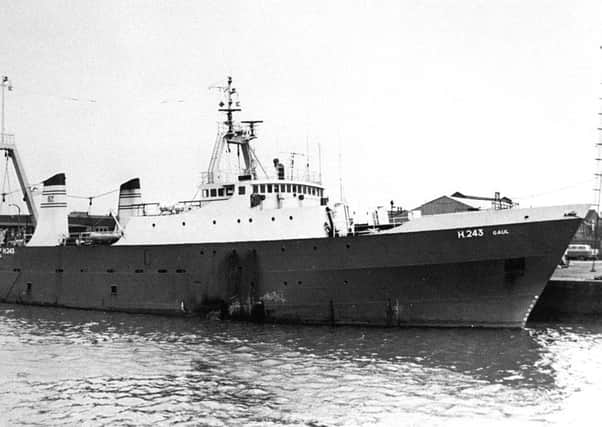Mystery of the ill-fated '˜Gaul': The Week That Was: August 9 to 15, 1999.


The samples, taken from bodies washed up and buried in unmarked graves on the Russian coast, were on their way to government laboratories in Wetherby.
Tests which could take months to complete would compare the DNA from the samples with that of relatives to see if the bodies were those of the 36 crew members. The bodies had been found on the remote Kola Peninsula shortly after Gaul sank off northern Norway in February 1974. Families of the lost men said if tests proved positive they would be anxious to have the bodies brought home.
Advertisement
Hide AdAdvertisement
Hide AdThe Gaul was lost amid rumours that it had been involved in a secret spying mission. There had been no distress call and the only wreckage recovered was a small buoy. But a Marine Accident Investigation Branch report had found no evidence of espionage and concluded that the vessel had sunk after being pounded by large waves.
Liberal Democrat rural affairs spokesman Charles Kennedy won the race to succeed Paddy Ashdown as party leader, beating off competition from four other candidates to win nearly 57 per cent of the vote by party members.
Mr Kennedy, 38, had been a high-profile supporter of Mr Ashdown’s efforts to build bridges with Labour, particularly over Europe and electoral reform.
Schemes to get cars off the road could be introduced without harm to the economy, the influential Standing Advisory Committee on Trunk Roads Assessment told the government this week.
Advertisement
Hide AdAdvertisement
Hide AdBut plans to pioneer a string of traffic-reduction schemes in Yorkshire prompted fears that the region’s economy could be badly hit. Drivers were already facing the possibility of tolls to enter Leeds city centre and for crossing the Pennines on the M62. The government was also considering taxation on parking at work.
New figures showed that links with the long-running TV comedy Last of the Summer Wine were helping to boost the economy of Kirklees – not just Holmfirth– by almost £150m a year.
The economic development survey found that tourism in the area supported 3,763 full-time jobs, and visitors initially attracted to Holmfirth, the ‘home’ of the show, were also spending their money in Huddersfield town centre.
A time-travelling, wise-cracking Virgin Mary, suffering all the angst of a thoroughly modern teenager was portrayed in a controversial diary-style new book by a Yorkshire vicar, which aimed to bring her story to a new audience.
Advertisement
Hide AdAdvertisement
Hide AdIn A Virgin’s Diary by the Rev David Wilbourne, Vicar of Helmsley, a bewildered Mary was mystified by her sudden pregnancy. Her condition was confirmed when she travelled with her doctor, Luke (he of gospel fame) for an ultrasound scan which showed the unborn Jesus complete with halo in her womb.
The author, former chaplain to Archbishop of York David Hope, had the backing of his former boss and other senior clergy, but the book also inevitably attracted criticism from some, who accused Mr Wilbourne of deliberately setting out to shock.
Prayer Book Society chairman Anthony Kilmister said: “I think if one has to descend to this form of writing, it’s rather pathetic and unworthy. In my view he shouldn’t trivialise the Christian story in such a commercial fashion.”
Mr Wilbourne said the book upheld traditional beliefs but “with a light touch”.